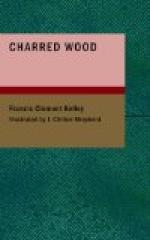CHAPTER V
WITH EMPTY HANDS
In the long after years Mark Griffin used to wonder at the strange way in which love for Ruth Atheson entered his life. Mark always owned that, somehow, this love seemed sent for his salvation. It filled his life, but only as the air fills a vacuum; so it was, consequently, nothing that prevented other interests from living with it. It aroused him to greater ambition. The long-neglected creative power moved without Mark’s knowing why. His pen wrote down his thoughts, and he no longer destroyed what he committed to paper. It now seemed a crime to destroy what had cost him only a pleasure to produce. The world had suddenly become beautiful. No longer did Japan and Siberia call to him. He had no new plans, but he knew that they were forming, slowly, but with finality and authority.
Yet Mark’s love was never spoken. It was just understood. Many times he had determined to speak, and just as many times did it seem quite unnecessary. He felt that Ruth understood, for one day, when an avowal trembled on his lips, she had broken it off unspoken by gently calling him “Mark,” her face suffused the while with an oddly tender light that was in itself an answer. After that it was always “Ruth” and “Mark.” Father Murray also seemed to understand; with him, too, it was “Ruth” and “Mark.” After one week of that glorious September, Mark was at Killimaga daily; and when October came and had almost passed, without a word of affection being spoken between them, Ruth and Mark came to know that some day it would be spoken, quite as naturally as she had uttered his Christian name for the first time. When Mark thought of his love, he thought also of his mother. He seemed to see her smile as if it quite pleased her; and he rejoiced that he could believe she knew, and saw that it was good.
“I love many things in men,” said Father Murray one day as he and Mark watched the waves dashing against the bluff. “I love generosity and strength, truthfulness and mercy; but, most of all, I love cleanness. The world is losing it, and the world will die from the loss. The chief aid to my faith is the clean hearts I see in my poor.”
“Uncle Mac again?” ventured Mark.
“Uncle Mac, and Uncles Mac—many of them. They have a heritage of cleanness. It is the best thing they brought to this new world, and we were the losers when they left us.”
“We? But you are English, are you not?” asked Mark courteously.
“Ah! So you caught me then, did you? Yes, I am English, or rather British. But don’t question me about that; I am real Yankee now. Even my tongue has lost its ancestral rights.”
Mark was persistent. “Perhaps you, too, have a little of the ’blessed drop’ that makes the Uncle Macs what they are? I really think, Father, that you have it.”




